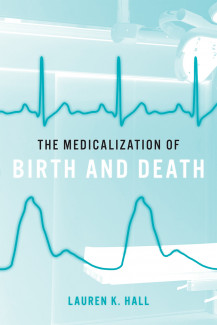
Johns Hopkins UniversityEst. 1876
America’s First Research University
Birth and Death in an Ethical Upside Down

The plot of the hit show Stranger Things revolves around another dimension, the Upside Down, where people’s thoughts and behaviors are controlled by an organism known as the Mind Flayer. When the Mind Flayer crosses into our world, it upends the moral foundations of human society. Our health care system is similarly controlled by an organism outside the ken of most patients and even physicians, in such a way that the foundational moral principals of medicine are turned upside down.
As I examine in my book The Medicalization of Birth and Death, the vast majority of people who give birth and who die in this country will do so with high intensity hospital-based care. This despite extensive research suggesting that pregnant women, the elderly, and the terminally ill all get too much care in our current system: too many interventions, too many medications, and too much time in hospitals, away from social support networks. Hospitalization itself is often harmful. Patients risk hospital-borne infections, medical mistakes, isolation from family and friends, lack of sleep, and discomfort. The dangers increase with frequent transfers, a serious problem for the elderly in particular. A quality health care system would have ways to distinguish between people who would benefit from hospital-based care (those with acute illnesses and surgical needs, for example) and those who would benefit from access to high-touch, low-tech care. Ample evidence from research on birth centers, hospice and palliative care, and home-based care suggests that the needs of many, if not most, birthing women, elderly people, and the terminally ill could be met more humanely and at considerably lower cost outside of hospitals.

Why is the U.S. a uniquely hospital-based health care system? Enter a Mind Flayer, in the form of the tangle of government policies and regulations that funnel everyone into the maw of hospital care, whether they want it or not. This tangle of regulations has its root in federal policies that prioritized building and funding hospitals—hospitals that must now be used for some purpose or other, even when such uses are inappropriate or a waste of scarce resources. To support the use of expensive existing hospitals, certificate of need laws in many states allow hospitals to directly control competition from less medicalized providers. Medicare and Medicaid reimbursement policies privilege hospital-based providers and specialists over home-based and community-based providers. And restrictive licensing laws target non-physicians, such as nurse practitioners and midwives, in some instances forcing them to operate in hospitals to maintain their licenses. The combined force of these policies channel both providers and patients into the highest-intensity and most costly form of care.
The costs of the Regulatory Mind Flayer are not merely economic. Hospital-based birth and death come with serious ethical and moral costs, including violations of the ethical principles that medicine claims to protect. Informed consent is almost non-existent in the current system, with pregnant women, the elderly, and the terminally ill subject to a range of “automatic” interventions the second they set foot in a hospital. These interventions are largely driven by the culture of risk avoidance in hospitals, as well as regulations that in some cases require providers to violate patient autonomy and override informed consent in order to maintain their licenses. Vaginal-birth-after-cesarean [VBAC] bans in hospitals around the country are just one example. Hospital-based care often violates the Hippocratic Oath to do no harm, as hospitalization for the birthing and dying entails high levels of unnecessary and frequently harmful interventions. It also challenges medicine’s commitment to justice, since minority and low-income Americans are often served in low-performing hospitals with high intervention rates and limited access to midwives, hospice and palliative care, and home-based services.
The regulatory privileging of hospitalization helps explain why despite spending more on health care per capita than any other country in the world, we still have the highest maternal and infant mortality of almost any developed country, extremely limited access to both hospice and palliative care, escalating rates of medical debt, and an increasingly traumatic health care experience for those at the most vulnerable points in their lives. Current calls for health care reform focus almost exclusively on putting more power over health care into the hands of the government. I suggest we exercise caution, to ensure we’re not putting more power in the hands of the Mind Flayer while trapped in the U.S. healthcare Upside Down.
Order The Medicalization of Birth and Death – published on December 17, 2019 – at the following link: https://jhupbooks.press.jhu.edu/title/medicalization-birth-and-death
Lauren K. Hall is an associate professor of political science at the Rochester Institute of Technology. She is the author of The Medicalization of Birth and Death and Family and the Politics of Moderation: Private Life, Public Goods, and the Rebirth of Social Individualism.



